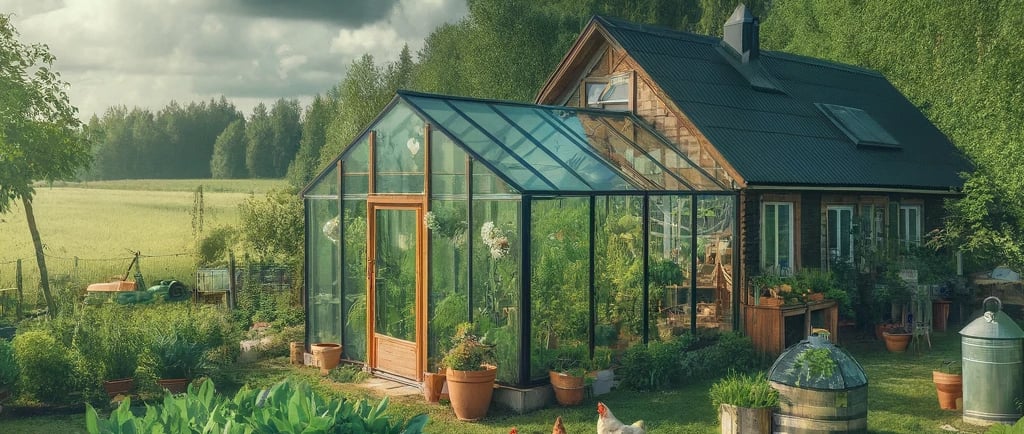Add your promotional text...
8 Essential Homesteading Tools for Sustainable Off-Grid Living
Living off-grid offers a unique journey toward self-sufficiency and sustainability, allowing you to reduce reliance on external resources while embracing a more natural lifestyle. However, making this transition successful requires the right tools and equipment that enhance efficiency and promote sustainable practices. Below are eight key tools every homesteader should prioritize to thrive in an off-grid environment.
10/11/20243 min read


1. Composting Systems
An efficient composting system is vital for sustainable off-grid living. By turning organic waste—such as kitchen scraps, yard debris, and animal manure—into nutrient-rich compost, you promote soil health and boost crop yields. Composting creates a closed-loop system, reducing the need for chemical fertilizers, which are both costly and environmentally harmful.
This method supports a self-sustaining homestead by transforming waste into valuable resources, ensuring the long-term fertility of your soil and increasing food production efficiency.
2. Water Collection and Filtration Systems
Water is essential for every homestead, and harvesting rainwater can be an effective way to ensure a reliable supply. A properly designed water collection system allows you to capture rainwater, which can be filtered for household use or irrigation.
With a large enough roof, you can collect up to 60 gallons of water for every inch of rainfall per 1,000 square feet of roof space. By pairing your collection system with a high-quality filtration setup, you can secure clean water year-round and become less reliant on outside sources.
3. Solar Power Systems
One of the most critical aspects of off-grid living is access to a dependable source of energy. Solar power systems provide a renewable energy solution that lowers reliance on fossil fuels and reduces energy costs.
Solar setups range from small, portable panels for charging devices to larger systems that power an entire homestead. On average, solar panels generate between 250 and 400 watts per panel. Additionally, incorporating battery storage ensures you have electricity even during cloudy days. While advanced systems like Tesla batteries can be expensive, they offer long-term, reliable energy for off-grid living.
4. Emergency Preparedness Gear
When living off the grid, preparing for unexpected events is essential. Natural disasters, equipment malfunctions, or injuries can occur when least expected. A comprehensive emergency preparedness kit can be a lifesaver in these situations. you can check out this kit online HERE
Items such as first aid supplies, multi-tools, fire-starters, and water purification tablets can keep you and your family safe. Emergency gear is particularly important in remote locations, where accessing medical or professional help may take time. Planning for these situations can make a significant difference in maintaining safety and well-being.
Here Is a few books i recomend
No Grid Survival projects Bible for your first 1000 days.
The Encyclopedia of Country Living, 50th Anniversary Edition:
5. Multi-Functional Gardening Tools
Growing your own food is at the core of homesteading, and having versatile gardening tools can make a big difference. Tools that serve multiple purposes, such as a garden hoe that also functions as a rake or a Hori Hori knife that combines a trowel with a serrated edge, help streamline tasks.
Investing in tools that perform well across various gardening jobs reduces the number of tools you need, saves space, and minimizes maintenance requirements. This multi-use approach makes gardening more efficient and convenient for homesteaders.
6. Portable Cooking Equipment
Portable cooking equipment is a must-have for off-grid living. Devices like solar ovens, rocket stoves, or propane grills enable you to prepare meals anywhere on your property using minimal resources.
Solar ovens, for example, harness the sun’s energy to cook food, eliminating the need for electricity or fuel. Rocket stoves are designed to use small amounts of wood efficiently, making them a practical option for cooking in a sustainable and resource-conscious way.
7. Mushroom Growing Kit
Growing mushrooms on your homestead can provide a sustainable food source while generating extra income. Mushrooms like morels or shiitake can be grown with relatively little space, and once harvested, they can be dried and sold for significant profit.
For example, dried morel mushrooms can fetch as much as $160 per pound at grocery stores. Mushroom-growing kits simplify the process and allow you to enjoy the benefits of this additional food source with minimal effort.
8. Communication and Security Systems
Off-grid living often comes with unique communication and security challenges. In remote areas where traditional cell service may not be available, tools like satellite phones or long-range two-way radios are invaluable for staying connected with family members or neighbors.
Additionally, security is essential for protecting your homestead from intruders or wild animals. Installing security cameras, motion sensors, and other protective measures can help ensure the safety of both your family and your property.
Essential Skills for Off-Grid Living
In addition to having the right tools, developing essential skills is crucial for thriving in an off-grid environment. Some key skills include:
Gardening: Learning how to grow your own food helps reduce grocery bills and ensures a steady supply of fresh produce. Understanding soil health, crop rotation, and organic pest control will increase your gardening success.
Animal Husbandry: If you plan to raise livestock, knowing how to care for and manage animals is vital. Research different breeds and their needs to provide the best environment for your livestock.
Water Management: Mastering water conservation techniques, such as rainwater filtration and irrigation, is essential to ensure a consistent water supply for your plants and animals.
Foraging and Wildcrafting: Identifying edible wild plants and herbs adds variety to your food supply and enhances your self-sufficiency.
Food Preservation: Techniques like canning, dehydrating, fermenting, and freezing allow you to extend the shelf life of seasonal produce, helping to prevent waste and maintain a steady food supply throughout the year.
By combining the right equipment with key skills, you can create a self-sustaining, off-grid lifestyle that promotes both independence and environmental responsibility.
